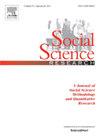有学习障碍和多动症青少年与无学习障碍和多动症青少年数学课程学习成绩差异的社会因素。
IF 3.5
2区 社会学
Q1 SOCIOLOGY
引用次数: 0
摘要
完成高中高等数学课程与更好的成年结果有关。我们对有学习障碍(LDs)和/或多动症(ADHD)的青少年较难完成高中数学课程的原因了解有限。利用 2009 年高中纵向研究(High School Longitudinal Study of 2009)中约 20,000 名青少年的数据,结果表明,无论残疾状况如何,家庭社会地位的结构性不平等对青少年数学课程学习成绩的影响比正式的残疾计划、普遍支持或学校对学生分类的结构性不平等更为显著。在具有相同残疾状况的青少年中,来自社会经济地位较高家庭的青少年,或其父母拥有 STEM 学位的青少年,即使在考虑了先前的成绩之后,也更容易获得较高的数学课程成绩。在对患有 LD 的青少年和患有 ADHD 的青少年进行控制后,获得高数学课程的机会仍然存在差异,这说明在高中阶段可能存在与残疾相关的分层和污名化现象。本文章由计算机程序翻译,如有差异,请以英文原文为准。
Social contributors to differences in math course attainment among adolescents with and without learning disabilities and ADHD
Completing advanced high school math coursework relates to better adulthood outcomes. Our understanding of why youth with learning disabilities (LDs) and/or ADHD have less access to high math course attainment is limited. Using data on around 20,000 adolescents from the High School Longitudinal Study of 2009, results indicate that, regardless of disability status, structural inequities in family social position are more salient for youth's math course attainment than formal disability programming, universal supports, or structural inequities in how students are sorted across schools. Among youth with the same disability status, youth from higher SES families, or whose parents have a STEM degree, have heightened access to high math course attainment even after accounting for prior achievement. Disparities in access to high math course attainment that persist net of controls for both youth with an LD and youth with ADHD present the possibility of disability-related stratification and stigma during high school.
求助全文
通过发布文献求助,成功后即可免费获取论文全文。
去求助
来源期刊

Social Science Research
SOCIOLOGY-
CiteScore
4.30
自引率
4.00%
发文量
0
审稿时长
65 days
期刊介绍:
Social Science Research publishes papers devoted to quantitative social science research and methodology. The journal features articles that illustrate the use of quantitative methods in the empirical solution of substantive problems, and emphasizes those concerned with issues or methods that cut across traditional disciplinary lines. Special attention is given to methods that have been used by only one particular social science discipline, but that may have application to a broader range of areas.
 求助内容:
求助内容: 应助结果提醒方式:
应助结果提醒方式:


